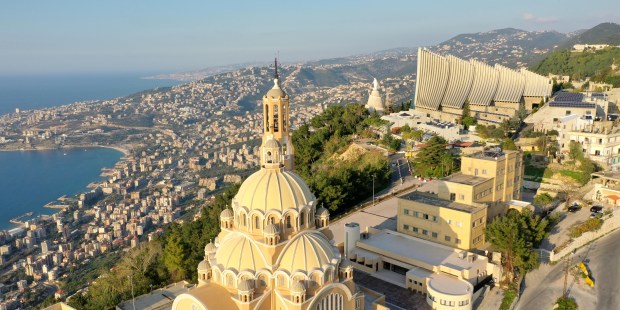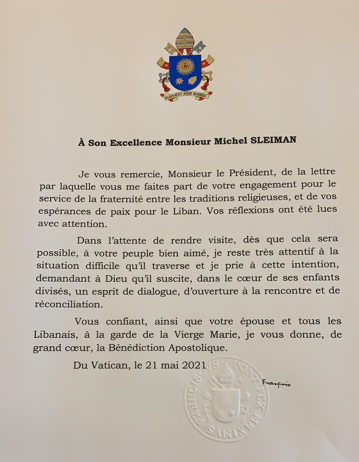
by aleteia.org -- The economic and political crisis in Lebanon, home to the Middle East’s largest Christian community, has deepened ahead of a historic July 1 meeting between Pope Francis and Christian leaders from the country. This week, the country’s currency plunged to a record low of 17,000 to the U.S. dollar, having lost 90% of its value since an economic crisis began in 2019. Mounting anger against the government has been exacerbated by a fuel crisis. A shortage of foreign reserves necessary to import fuel has left many Lebanese waking up at 3:00 a.m. to line up at petrol stations, in scenes more reminiscent of Venezuela than one of the region’s more prosperous countries. For years, Lebanon has stood apart in the Middle East as a haven for Christians. It does not mandate Islam as a state religion, and an informal agreement even dictates that the President be a Maronite Catholic. For this reason, it has welcomed thousands of Christian refugees fleeing persecution in Iraq or Syria. “Over the years, when we have seen a rise in extremism in other countries, Lebanon has been a place where the Christians and the Muslims could live together, be educated together, to work together, and we would like to see this continue”, said Regina Lynch, Director of projects of the charity Aid to the Church in Need (ACN).
Today, however, its status as a haven for Christians is under threat. The currency crisis has been exacerbated not only by the economic fallout of the pandemic but also by the impact of an explosion last year in Beirut, one of the largest non-nuclear explosions ever recorded. The blast decimated the mostly Christian neighborhoods around Beirut’s port area, killing at least 200 people. Almost 100,000 buildings were destroyed and several hundred thousand people were left homeless in one fell swoop. “The Catholic schools are in danger of closing. The Catholic institutes like hospitals and clinics are struggling to survive, even to find the funds they need to buy important medicines and important medical equipment, so it’s really five minutes to zero hour now at the moment in Lebanon”, stated Regina Lynch.
by reuters — The government last week effectively cut fuel subsidies as Lebanon grapples with a catastrophic economic collapse that has sunk …
by Soraya Ebrahimi — thenationalnews.com — The Lebanese Army will start offering tourists helicopter joyrides this week in a bid to fill the …
هل يبدأتصويب بوصلة المسيحيين في لقاء الفاتيكان؟

في خضمّ الاضطرابات على الساحة الاقليمية والبحث الجاري عن تفاهمات دولية لتقاسم النفوذ وحماية مصالح اللاعبين الأمَمِيّن، يتخبّط لبنان في أزمات متدحرجة أدّت إلى انهيار اقتصاده وإلى فشل إدارته السياسيّة.
في ظلّ هذا الانهيار العائد بمعظمه إلى فقدان سيادة الدولة على اراضيها وكذلك على شؤونها السياسية والحياتية، تطغى على المواطنين حالة قلقٍ على الهويّة والمصير ويمضي الجميع في البحث عن حلول للحفاظ على هذه الهويّة والتعدّدية، تتراوح من الحياد الناشط التي زُرعت أساساته في إعلان بعبدا 2012 إلى المطالبة بعقد مؤتمر دولي للاتفاق على هذا الحياد، وفقًا لمبادرة البطريرك الانقاذية. هذا الاهتمام الدولي المطلوب شهد بداياته عامي 2012 و 2013 من خلال تبني الأمم المتّحدة إعلان بعبدا كوثيقةٍ رسمية، كما ومن خلال إطلاق المجموعة الدولية لدعم لبنان في نيويورك التي بنيت على هذا الاعلان، وذلك تحت رعاية الامم المتحدة وبمشاركة الدول الخمس زائد المانيا وايطاليا والبنك الدولي والجامعة العربية والاتحاد الاوروبي. أمّا في الداخل، وبحجّة حماية حقوق المسيحيين والمحافظة على التعدّدية، فتتزاحم المشاريع السياسيّة والاقتصاديّة وبدلاً من اللامركزية الادارية تطرح الفيدرالية التي من شأنها أن تزيد من عزلة المسيحيين وتلغي دورهم في بقاء لبنان وطن رسالة، كما يدعو بعض انصار "المسيحية المشرقية" إلى تحالف الأقلّيات ما يدفع بالمسيحيين الى الابتعاد عن قضايا اوطانهم القومية او الانخراط في محاور الممانعة وصراعاتها المدمّرة أو اللجوء مستقبلاً إلى الحماية العسكرية الأجنبية أو إلى التماهي مع الأنظمة غير العادلة والمتسلّطة الامر الذي يَسْتَبْطِنُ مشروع عداوة مع الشعوب خاصّة العربية منها ويتناقض مع روح الدين المسيحي الرافض لأي قهر وظلامية و ظلم.
Khazen History


Historical Feature:
Churches and Monasteries of the Khazen family

St. Anthony of Padua Church in Ballouneh
Mar Abda Church in Bakaatit Kanaan
Saint Michael Church in Bkaatouta
Saint Therese Church in Qolayaat
Saint Simeon Stylites (مار سمعان العامودي) Church In Ajaltoun
Virgin Mary Church (سيدة المعونات) in Sheilé
Assumption of Mary Church in Ballouneh
1 - The sword of the Maronite Prince
2 - LES KHAZEN CONSULS DE FRANCE
3 - LES MARONITES & LES KHAZEN
4 - LES MAAN & LES KHAZEN
5 - ORIGINE DE LA FAMILLE
Population Movements to Keserwan - The Khazens and The Maans
ما جاء عن الثورة في المقاطعة الكسروانية
ثورة أهالي كسروان على المشايخ الخوازنة وأسبابها
Origins of the "Prince of Maronite" Title
Growing diversity: the Khazin sheiks and the clergy in the first decades of the 18th century
Historical Members:
Barbar Beik El Khazen [English]
Patriach Toubia Kaiss El Khazen(Biography & Life Part1 Part2) (Arabic)
Patriach Youssef Dargham El Khazen (Cont'd)
Cheikh Bishara Jafal El Khazen
Patriarch Youssef Raji El Khazen
The Martyrs Cheikh Philippe & Cheikh Farid El Khazen
Cheikh Nawfal El Khazen (Consul De France)
Cheikh Hossun El Khazen (Consul De France)
Cheikh Abou-Nawfal El Khazen (Consul De France)
Cheikh Francis Abee Nader & his son Yousef
Cheikh Abou-Kanso El Khazen (Consul De France)
Cheikh Abou Nader El Khazen
Cheikh Chafic El Khazen
Cheikh Keserwan El Khazen
Cheikh Serhal El Khazen [English]
Cheikh Rafiq El Khazen [English]
Cheikh Hanna El Khazen
Cheikha Arzi El Khazen
Marie El Khazen